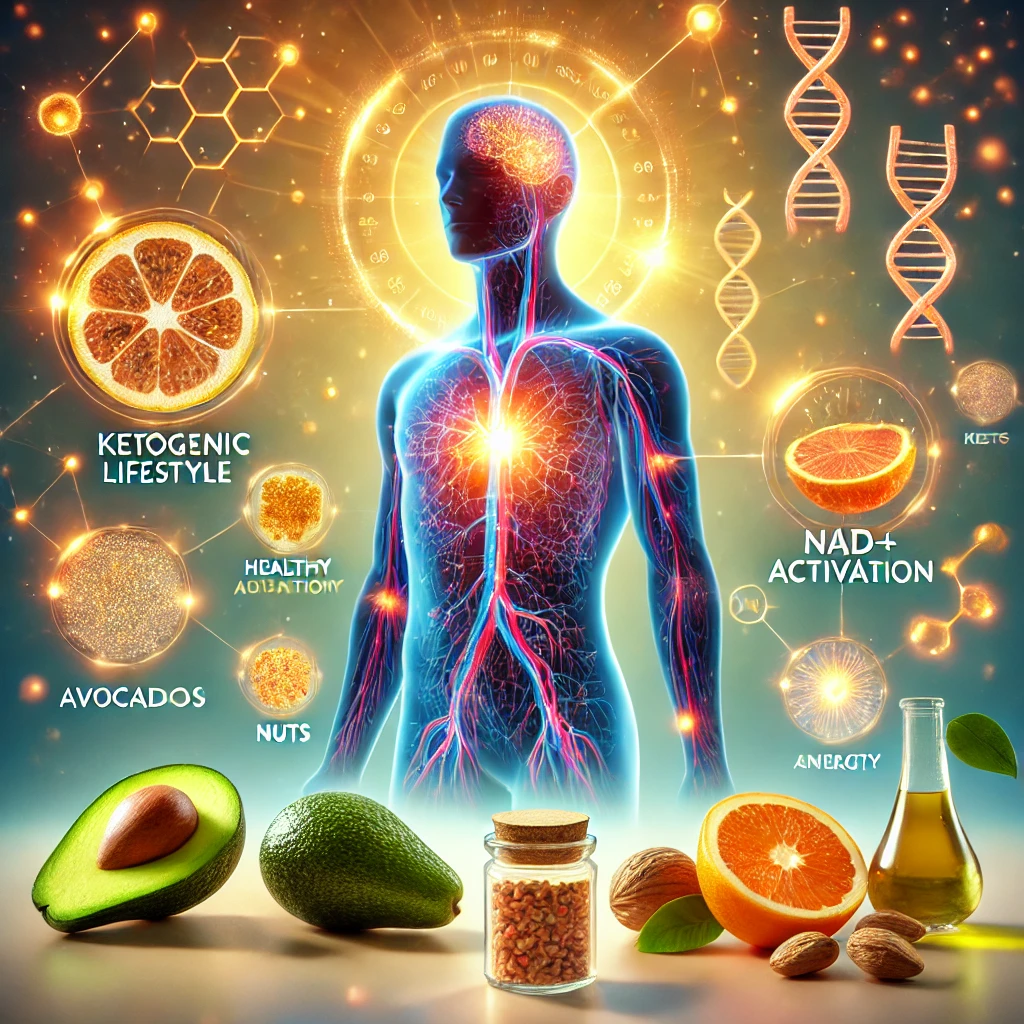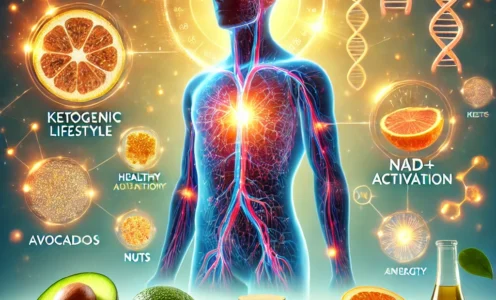The ketogenic diet has gained popularity not only as a weight loss tool but as a pathway to optimising energy levels, mental clarity, and long-term health. At the heart of its benefits lies a powerful molecule called NAD⁺ (nicotinamide adenine dinucleotide). Often referred to as the “fountain of youth” for its cellular repair properties, NAD⁺ is integral to energy production, DNA repair, and activating pathways that protect cells against stress. Here, we explore how a ketogenic lifestyle can increase NAD⁺ levels, why this matters, and how it could support health and longevity.
Understanding NAD⁺: The Cellular Powerhouse
NAD⁺ is a molecule found in every cell of the body and plays a critical role in cellular function. It’s involved in:
1. Energy Production: NAD⁺ helps convert nutrients into ATP (adenosine triphosphate), the energy currency of the cell.
2. DNA Repair: Cells constantly undergo wear and tear, and NAD⁺ aids in repairing damaged DNA, which is essential for healthy aging.
3. Sirtuin Activation: Sirtuins are proteins that protect cells under stress and are linked to longevity. They rely on NAD⁺ to function effectively, making NAD⁺ essential for activating these longevity-promoting proteins.
Unfortunately, NAD⁺ levels naturally decline with age, contributing to decreased cellular efficiency and increased susceptibility to illness. This is where the ketogenic lifestyle comes in.
How the Ketogenic Lifestyle Boosts NAD⁺
A ketogenic diet, which involves consuming high-fat, moderate-protein, and very low-carbohydrate foods, encourages the body to enter ketosis, a state where fat is used as the primary fuel instead of glucose. This metabolic switch has profound effects on NAD⁺ levels and the cellular processes that rely on it:
1. Increases NAD⁺ / NADH Ratio: The high-fat, low-carb nature of the ketogenic diet decreases glucose metabolism, which reduces NADH (the reduced form of NAD⁺) and thereby increases the overall NAD⁺ / NADH ratio in cells. This increased ratio provides cells with more NAD⁺, which they can use for essential functions like DNA repair and energy production.
2. Enhances Mitochondrial Efficiency: Ketones, produced from fat breakdown, are a more efficient fuel source for mitochondria, the powerhouses of the cell. This enhanced mitochondrial function supports a greater availability of NAD⁺, which can lead to increased cellular energy and decreased oxidative stress, benefiting overall cellular health.
3. Promotes Sirtuin Activity: The ketogenic state activates sirtuins, the proteins linked to longevity and cellular protection. Since sirtuins require NAD⁺ to function, increased NAD⁺ levels in ketosis can boost sirtuin activity, enhancing cellular repair and potentially slowing down the aging process.
4. Synergises with Intermittent Fasting: Many people combine a ketogenic diet with intermittent fasting. Fasting naturally boosts NAD⁺ levels by signalling the body to switch from glucose to fat as its primary fuel source. When combined with a ketogenic diet, fasting can amplify NAD⁺ production, creating a synergistic effect on cellular health and metabolic efficiency.
The Benefits of NAD⁺ Activation on a Ketogenic Diet
With the increased NAD⁺ production that comes from ketosis, the body can access a host of potential benefits:
• Improved Mental Clarity and Focus: NAD⁺ supports brain health by aiding in energy production and reducing neuroinflammation. This can lead to clearer thinking, faster recall, and improved focus.
• Enhanced Physical Performance: Elevated NAD⁺ levels mean greater energy production and improved muscle function. This can lead to better endurance and recovery.
• Anti-Aging and Longevity: The NAD⁺ / sirtuin pathway is associated with extended lifespan in animal studies, and while research on humans is ongoing, increased NAD⁺ levels could contribute to healthier aging and potentially a longer life.
• Cellular Resilience and Repair: With more NAD⁺, cells can repair DNA damage more efficiently, making the body more resilient to oxidative stress and daily wear and tear.
Practical Tips for Boosting NAD⁺ on a Ketogenic Lifestyle
To maximise NAD⁺ activation on a ketogenic diet, consider incorporating the following strategies:
1. Combine Keto with Intermittent Fasting: Alternate between eating and fasting periods, which can help enhance NAD⁺ levels and support ketosis. For example, try an 18:6 approach (18 hours fasting, 6 hours eating window) to support cellular repair and boost NAD⁺.
2. Focus on Quality Fats: MCT oils, avocados, and grass-fed butter are excellent fat sources that support ketosis and provide the body with stable energy, supporting cellular function and NAD⁺ production.
3. Include Exercise: Regular exercise can increase mitochondrial efficiency and NAD⁺ levels. Resistance training and high-intensity interval training (HIIT) are particularly beneficial for those on a ketogenic diet, as they align well with fat metabolism.
4. Supplement Wisely: Some supplements, such as nicotinamide riboside or nicotinamide mononucleotide (NMN), can further increase NAD⁺ levels, though it’s always best to consult with a healthcare provider before starting any new supplement regimen.
Conclusion: Empowering Health and Longevity Through Keto and NAD⁺
The ketogenic lifestyle is more than just a diet; it’s a metabolic state that optimises energy, supports mental clarity, and promotes cellular health. By increasing NAD⁺ levels and activating pathways that protect and repair cells, keto can be a powerful tool for those looking to improve their health and potentially extend their lifespan. Whether you’re new to keto or a seasoned practitioner, understanding the role of NAD⁺ can help you harness the full benefits of this lifestyle, supporting a healthier, more resilient, and energised life.


Great info Rowan !
Could you indicate the value of 24hr, 36hr and 48hr fasts, is longer better? Does it matter which age you are with different fasting period lengths?
Hi Nigel,
Here is a post that should answer that question:
https://www.theketocoach.co.uk/2025/02/11/the-science-and-practice-of-fasting/
Any more questions just ask <3